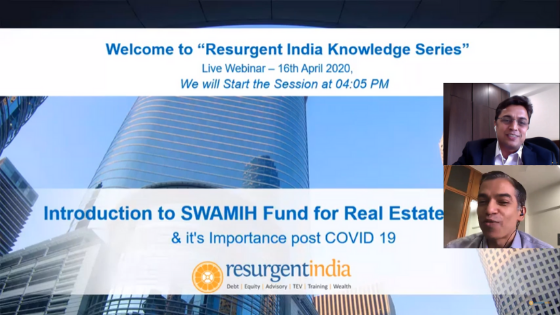RESURGENT INDIA KNOWLEDGE SERIES PRESENTS
Webinar on: "Introduction to Swamih Fund for Real Estate Funding "
Speaker-Mr Irrfan Kazi, Chief Investment Officer- SWAMIH FUND-1, SBICAP Ventures.
Moderated by- Mr. Jyoti Prakash Gadia, MD- Resurgent India Limited
Premise
Key takeaways
Introduction to Fund
⇒ An AIF of Rs 25000 Cr approved by Union budget to provide last mile funding for affordable housing/mid-income category stalled or likely to be stalled projects under construction
⇒ The fund is managed by CIO Irfan Kazi and a qualified team of around 22 professionals.
⇒ The fund has two stages of the approval process. Initial IC and Final IC. The Preliminary IC involves a lot of analysis based on the information provided by the developer which is followed by external due diligence
⇒ That includes financial, technical, legal, forensic examination, valuation, and ESG analysis
⇒ Since the announcement, the fund had its first closure at Rs 10,530 Cr. The fund is in process of evaluating more than 400 proposals. It has successfully tapped 6 deals that are past the second stage of approval and looking up at about 30+ proposals that are at the initial stage of consideration. This portfolio of deals will kickstart construction work for close to 40,000 units.
⇒ Funds are disbursed after the Final IC approval subjected to some critical conditions that have to be agreed by the borrower.
⇒ The fund aims at providing relief to the homebuyers, restore faith in the project and also simultaneously generate sizeable profits for the investors of the fund.
⇒ The fund aims at IRR and the Cost of funding of about 14-15% for the investors and developers. There is no return on capital until the project is completed. However, 10-15% of project cash inflow may flow back to investors but the dominant portion is diverted back into the project. funds are precisely limited to completion of the project and radically exclude funds for any penalties or interest charges or for any other creditors.
Eligibility Criteria
⇒ The fund has a mandate for the project that complies strictly with the following conditions
⇒ RERA: Only RERA approved project.
⇒ Project Completion: 30-90% completed of project cost (includes all the cost except interest cost and penalties levied by the authorities)
⇒ Affordable & Mid-Housing: At least 90% of the available FSI/FAR is being developed as Affordable housing/Mid income housing units with a saleable unit value of less than 2 Cr, 1.5 Cr and 1 Cr for Mumbai, NCR & Delhi Chennai, Kolkata, Pune Hyderabad, Bangalore, Others.
⇒ Newly launch projects that meet the above-mentioned criteria, projects under proceedings of NCLT, Plotted development whose apartment equivalent construction cost is less than 2,1.5, 1 cr, and township projects (subjected to a judgment call on basis of number of home buyers involved and positive net worth) and projects from ARCs are all qualified for the funding.
⇒ Under mixed land approved projects, the fund strategizes on ways to exclude the commercial aspect of the project and continue its patented funding provided close to 90% of units are residential.

⇒ The funding is for about 4-5 years. It is done in the form of Non-convertible debentures and there is no immediate repayment. 100% of the funds are streamed into the completion of the project. The project completion timeline could be anywhere from 6 to 9 months to 3 years. Based on the conservative assumption of timeline and sales velocity, the fund is projected to generate IRR in 3 years’ time.
⇒ It also assesses projects appraised by non-profit organizations like RWA and SRA subjected to prerequisites and credentials of the developer.
⇒ It also requires to have cash flow cover and security cover depending on the quality of cash and size and nature of the project. The fund doesn’t penalize for prepayment or has any processing fees.
⇒ Under the instance where the land is pre-owned by the developer, the fund lacks transparency on whether to include the cost(historical or market) in the project cost.
COVID-19 and relative impact
⇒ COVID-19 has negatively impacted the country as a whole and therefore there is collateral damage in most of the economic sectors of the nations including real estate.
⇒ At this time, monetizing the opportunity is far more favorable than chasing quantum and it’s eminent to improve the sales velocity than price correction.
►Watch the webinar on YouTube: https://www.youtube.com/watch?v=TBs3dIYEnm4